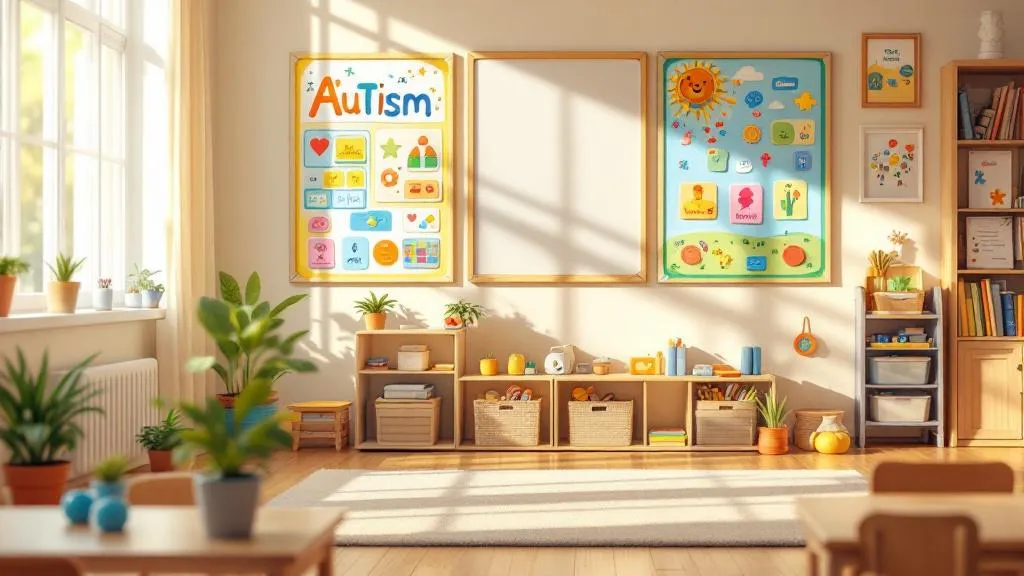Can ABA therapy help with social skills development in teens
Unlocking Social Success: The Role of ABA Therapy in Teen Development

Understanding ABA Therapy and Its Impact on Teen Social Skills
Applied Behavioral Analysis (ABA) therapy is a scientifically validated approach to supporting adolescents with autism and developmental delays in developing crucial social skills. With a foundation in the science of learning and behavior, ABA systematically teaches teens to communicate, interact, and build meaningful relationships. This comprehensive intervention emphasizes personalized treatment plans that incorporate evidence-based techniques. In this article, we explore how ABA therapy fosters social skills development in teens, the strategies involved, and the evidence supporting its effectiveness, offering insight into how this therapy can transform social engagement for adolescents.
Core Techniques in ABA for Enhancing Social Communication
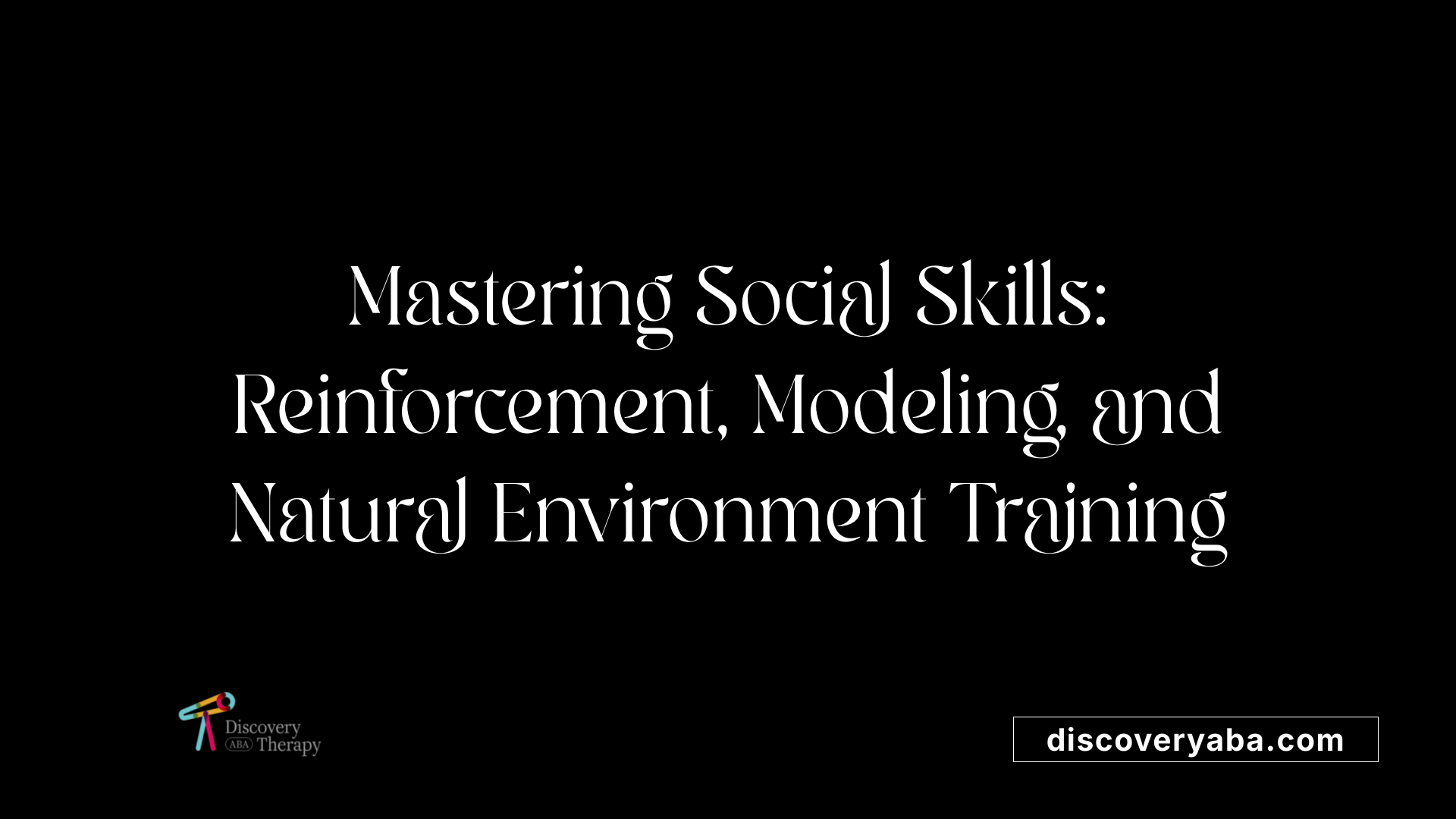
What are effective strategies used in ABA therapy to improve social communication among teens?
ABA therapy employs a variety of targeted strategies designed to improve social communication skills in teenagers, especially those on the autism spectrum. These methods focus on reinforcing positive behaviors, teaching social cues, and ensuring skills are applicable in real-life situations.
One primary approach is reinforcement. By providing positive rewards, therapists motivate teens to initiate conversations, share emotions, and demonstrate empathy. This encouragement helps make social interaction more engaging and desirable.
Modeling and imitation are also crucial components. Therapists demonstrate appropriate social behaviors, such as respectful greetings or active listening, which teens observe and imitate. This visual learning aids in understanding complex social norms.
Prompting and fading are techniques used to guide teens through responses during social interactions. Initially, prompts such as hints or cues support correct responses. Over time, these prompts are gradually reduced, promoting independence and confidence.
Natural Environment Training (NET) plays a significant role by practicing social skills in settings that mirror real-world situations. This practical application helps teens transfer learned behaviors to everyday life, whether in school, at home, or within the community.
An individualized approach considers each teen's unique emotional processing challenges, like difficulty recognizing emotions (alexithymia) or sensitivity to rejection. Tailoring these techniques to meet personal needs enhances overall effectiveness.
In summary, ABA employs reinforcement, modeling, prompting, and natural environment training as effective strategies to foster meaningful social communication among teens, supporting their growth in social confidence and interaction skills.
Steps Involved in Developing Robust Social Skills in Teens through ABA
How does ABA therapy support social skills development in teenagers?
ABA therapy plays a crucial role in helping teenagers improve their social abilities by providing structured, individualized strategies grounded in behavioral science. It teaches teens to communicate more effectively, whether verbally or non-verbally, and helps them initiate and sustain meaningful conversations. Through techniques like modeling, role-playing, and positive reinforcement, teens learn to interpret social cues such as body language, facial expressions, and tone of voice.
The therapy emphasizes breaking complex social skills into smaller, manageable steps. For example, a teen might learn how to start a conversation with a peer, ask follow-up questions, and respond appropriately to social feedback. Role-playing activities allow teens to practice real-life scenarios, like asking a teacher for help or joining a group activity, which builds confidence.
ABA therapists often incorporate visual aids and structured practice sessions in both one-on-one and group settings. They teach essential social skills such as turn-taking, sharing, respecting boundaries, and working collaboratively. Using positive reinforcement, successful social interactions are rewarded, motivating teens to continue practicing these skills.
Another important aspect is generalization—the ability to apply learned skills across different environments like school, home, or community. ABA programs are designed to promote this transition, ensuring teens can use their social skills consistently in real-world situations.
Parental involvement is emphasized to reinforce skills outside therapy sessions. Families are encouraged to support practice at home, observe progress, and provide reinforcement, creating a supportive environment for ongoing development.
Overall, ABA therapy enhances teens' social confidence, helps them build friendships, and reduces anxiety related to social interactions. These improvements contribute to better communication, greater independence, and an improved quality of life for teens as they learn to navigate complex social landscapes.
Implementation and Considerations for Effective ABA Interventions in Adolescents
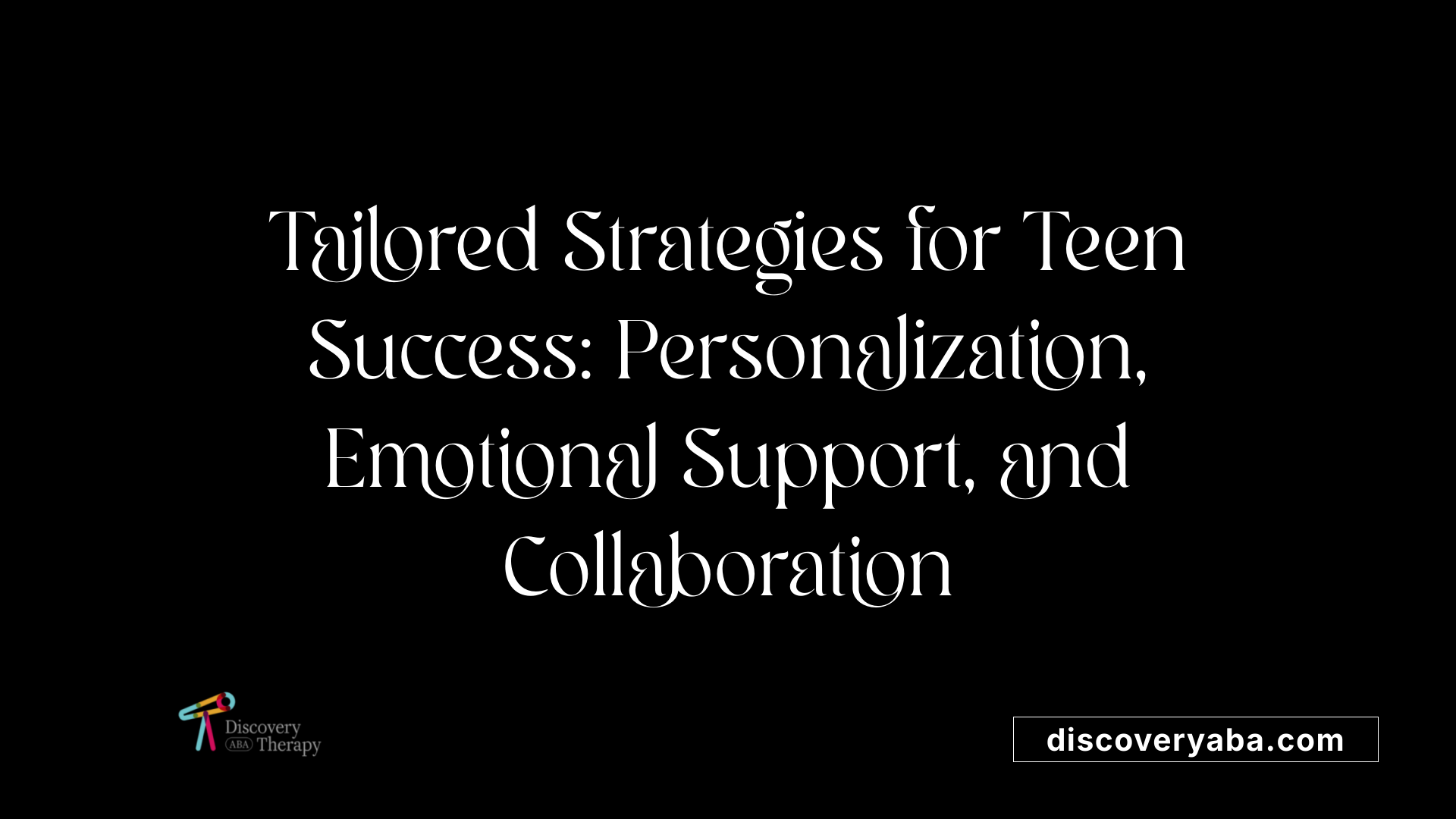
What considerations are important for implementing ABA therapy to foster social skills in adolescents?
Implementing ABA therapy to help teenagers develop essential social skills requires careful planning and personalization. It's vital to create treatment plans tailored to each adolescent's unique needs, strengths, and challenges. This involves conducting comprehensive assessments to identify specific areas for growth in social communication and behavior.
A cornerstone of effective ABA therapy is incorporating engaging techniques such as role-playing, social stories, video modeling, and structured group activities. These methods expose teens to real-life social scenarios, helping them practice and internalize skills like initiating conversations, interpreting social cues, and maintaining friendships.
Positive reinforcement remains a key strategy — rewarding socially appropriate behaviors to motivate ongoing progress. Prompting and modeling are also employed to demonstrate desired behaviors, which teens can imitate and adapt in various settings.
Addressing emotional and behavioral challenges is equally important. Using functional behavior assessments (FBA) and behavior intervention plans (BIP) supports the management of problematic behaviors, making social interactions smoother. Teaching coping strategies, such as mindfulness techniques, helps teenagers regulate emotions during social situations.
Developing social independence involves more than interaction skills; it includes daily living skills like self-care, vocational training, and community participation. These skills foster confidence and autonomy beyond the therapy sessions.
Collaboration among therapists, parents, and educators enhances the consistency and generalization of skills learned. Engaging caregivers in reinforcement activities at home and supporting school-based social skills programs amplify therapy outcomes.
Addressing nonverbal cues such as eye contact, body language, and facial expressions is critical. Gradual and individualized training, often supported by alternative communication methods if needed, ensures teens develop comprehensive social competence.
In summary, successful ABA intervention for adolescents hinges on personalized, diverse approaches that integrate behavioral techniques with emotional support, teamwork, and real-world practice—creating a strong foundation for social success.
Evidence-Based Support for ABA’s Effectiveness in Teen Social Skills Enhancement
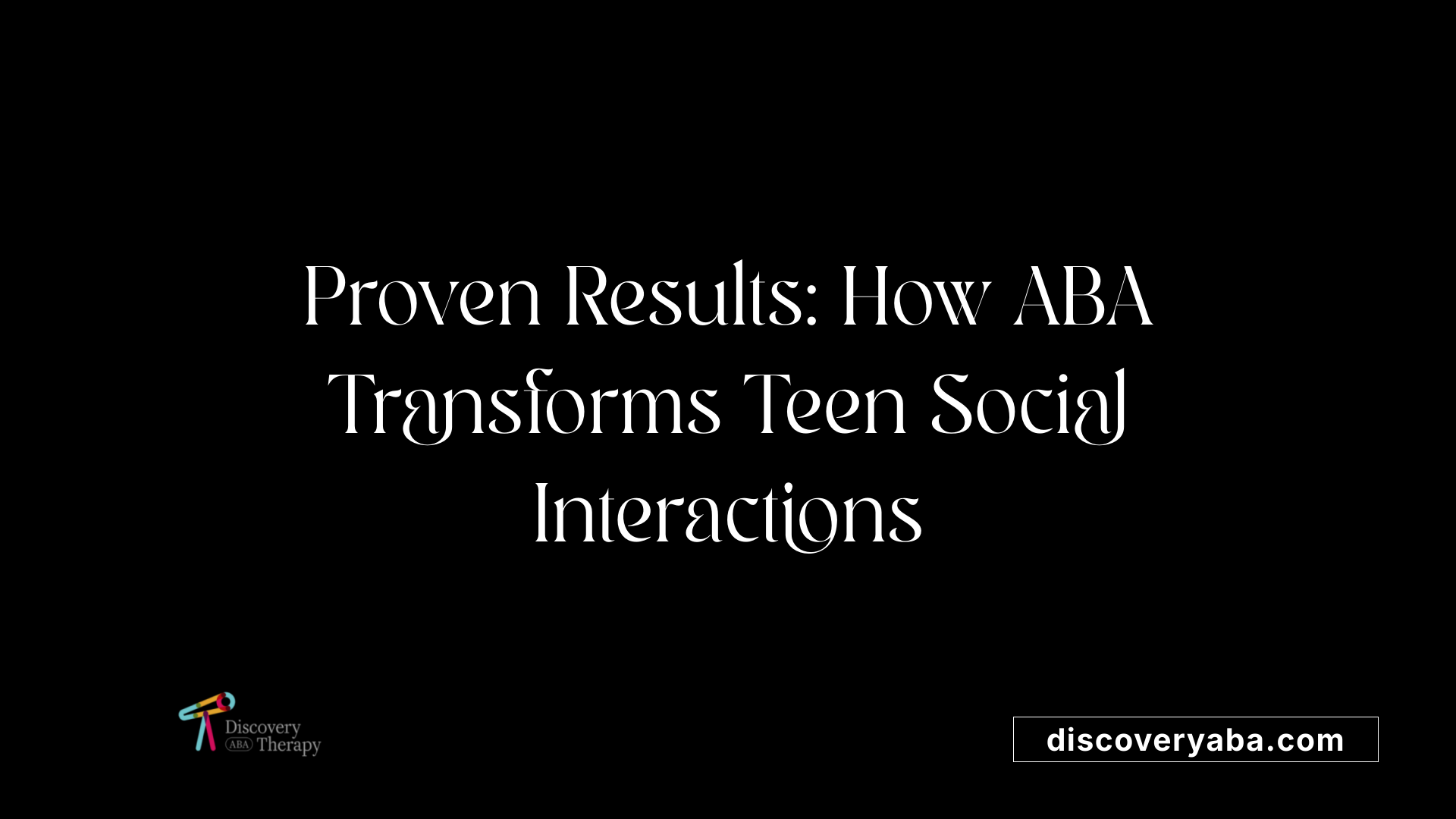
Is ABA therapy effective in enhancing social skills in teenagers?
Research consistently demonstrates that ABA (Applied Behavioral Analysis) is highly effective in improving social skills among teenagers with autism spectrum disorder (ASD). This evidence-based approach focuses on teaching teenagers to recognize and interpret nonverbal cues such as body language, facial expressions, and tone of voice by using techniques like role-playing, modeling, and video examples.
ABA therapists break down complex social behaviors into manageable steps, teaching skills such as initiating conversations, asking follow-up questions, and maintaining peer interactions. Techniques like positive reinforcement motivate teens to practice and retain these skills, often leading to increased confidence and social engagement. For example, teens learn to navigate social situations confidently through structured role-playing exercises that simulate real-life scenarios, like asking a teacher for help or greeting a peer.
The therapy also emphasizes teamwork in group settings, teaching skills such as taking turns, sharing, and respecting boundaries through guided practice. Special activities like social stories and natural environment training further support generalization and application of skills beyond therapy sessions.
Numerous studies support the effectiveness of ABA, showing improvements in communication, social interaction, and emotional understanding — all crucial for building friendships and social participation. These benefits extend into long-term gains, with skills being retained and applied across different contexts in teens' daily lives.
Parents and caregivers are integral to this process, as they reinforce skills at home and in community settings. The involvement of trained professionals—including Board Certified Behavior Analysts (BCBAs) and Registered Behavior Technicians (RBTs)—ensures that interventions are tailored to each teen’s individual needs.
How does research support the long-term benefits of ABA in social skills?
Studies highlight that early and consistent ABA intervention can lead to sustained improvements in social functioning. When social skills are systematically taught and reinforced, teens often develop better peer relationships, improved communication abilities, and greater independence.
The long-term advantages include enhanced academic participation, professional interactions, and community involvement, contributing to overall quality of life. The focus on generalization within ABA programs helps teens apply learned skills across various settings, creating consistency and confidence in social interactions.
What methods make ABA a validated approach?
ABA utilizes scientifically validated methods such as discrete trial training, natural environment teaching, shaping, chaining, modeling, and reinforcement. These strategies are supported by more than 20 research studies affirming their efficacy in fostering social skills in children and teens.
The structured assessment phase helps identify specific goals for each individual, ensuring that interventions target relevant competencies like active listening, emotional recognition, and problem-solving. This personalization, combined with systematic teaching and reinforcement, makes ABA a trusted and proven approach.
MethodDescriptionTypical ApplicationDiscrete Trial TrainingStructured, repeated trials to teach specific skillsSocial cue recognition and responseNatural Environment TeachingTeaching skills in real-life contextsConversation skills during playModelingDemonstrating desired behaviorsRespectful greetings and conflict resolutionPositive ReinforcementRewarding desirable behaviorsEncouraging eye contact and sharingShaping and ChainingBuilding complex skills step-by-stepInitiating conversations or turn-taking
These methods, combined with ongoing assessments and caregiver involvement, underpin ABA’s validated success in supporting teenagers’ social development. This comprehensive approach ensures that social skills are learned, practiced, and retained, leading to meaningful improvements in everyday social interactions.
Social Skills Addressed and Enhancing Strategies in ABA Therapy
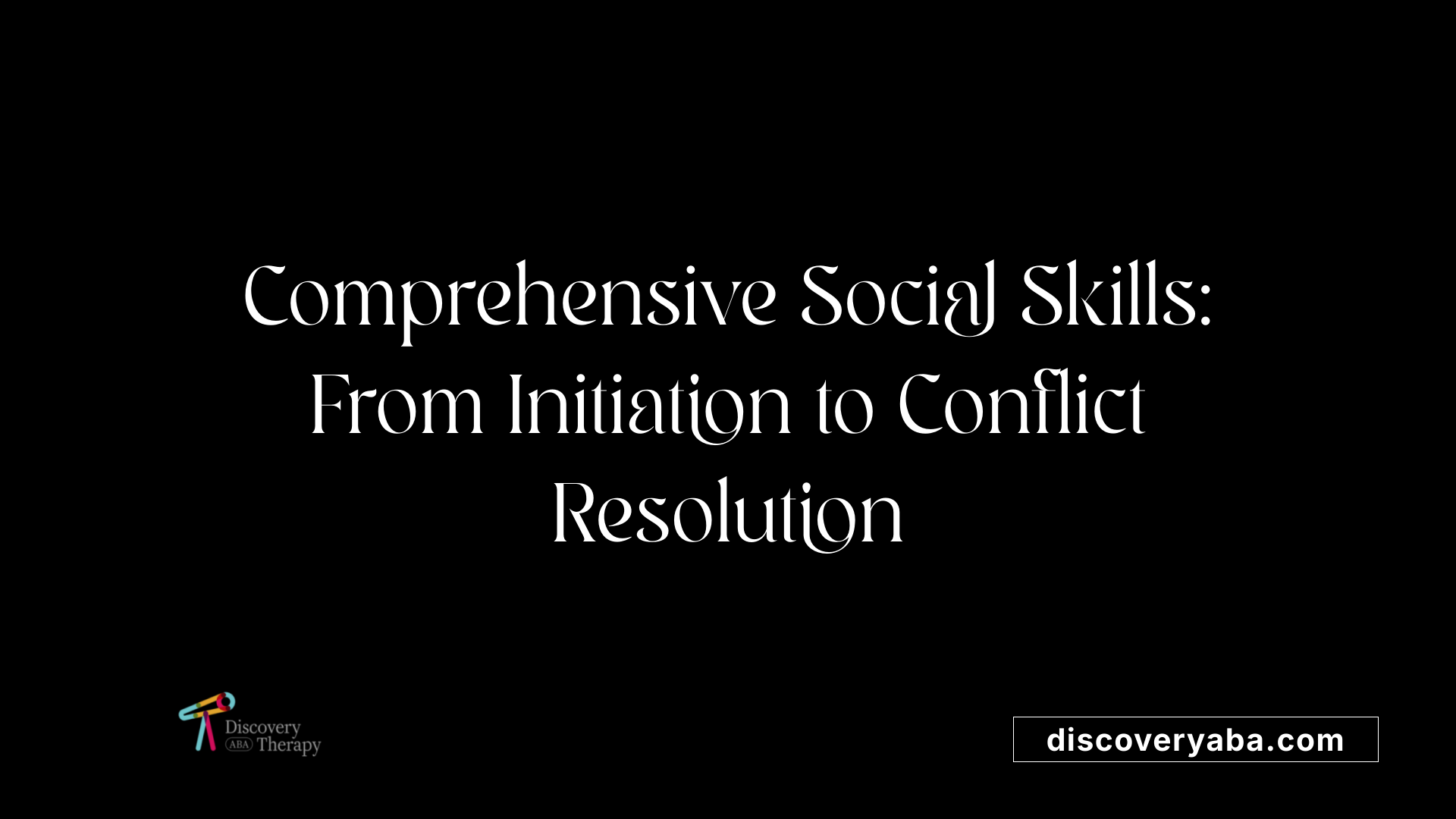
What social interaction skills does ABA therapy focus on?
ABA therapy aims to develop a broad range of social interaction skills in teens. These include initiating and maintaining conversations, understanding social cues, taking turns, sharing, and collaborating with peers. Therapists often break these skills into manageable steps, teaching each component systematically. Role-playing, social stories, and guided practice help teens become more confident in social settings.
How does ABA therapy improve non-verbal communication?
Recognizing non-verbal cues like body language, facial expressions, and tone of voice is a vital part of ABA social skills training. Through video examples, modeling, and activities like role-playing, teens learn to interpret and use non-verbal signals effectively. These skills are essential for meaningful interactions, helping teens respond appropriately and understand others more deeply.
What approaches does ABA use to teach conflict resolution and emotional understanding?
ABA incorporates strategies to help teens identify emotions, manage their feelings, and resolve conflicts peacefully. Teaching techniques include modeling respectful disagreement, practicing problem-solving in structured settings, and reinforcing calm, socially appropriate reactions. By learning these skills, teens can better handle social challenges and foster healthier relationships.
How are peer and group activities incorporated into ABA to enhance social skills?
Group settings provide opportunities for teens to practice social skills in realistic environments. ABA programs often include structured group play, social skills groups, and community outings. These environments help teens generalize skills like turn-taking, following directions, and respecting boundaries, while also building friendships and improving social confidence.
Evidence supporting ABA’s effectiveness in teens' social development
Research consistently supports ABA as an effective approach for improving social skills in teens. Numerous studies show that structured ABA programs lead to meaningful gains in social interactions, communication, and adaptive behaviors. Recognized as an evidence-based practice, ABA’s effectiveness is backed by data, clinical results, and reviews from reputable health organizations. Customized programs, continuous monitoring, and real-world practice contribute to lasting improvements in social confidence and peer relationships.
Broader Social and Life Skills Benefits of ABA Therapy
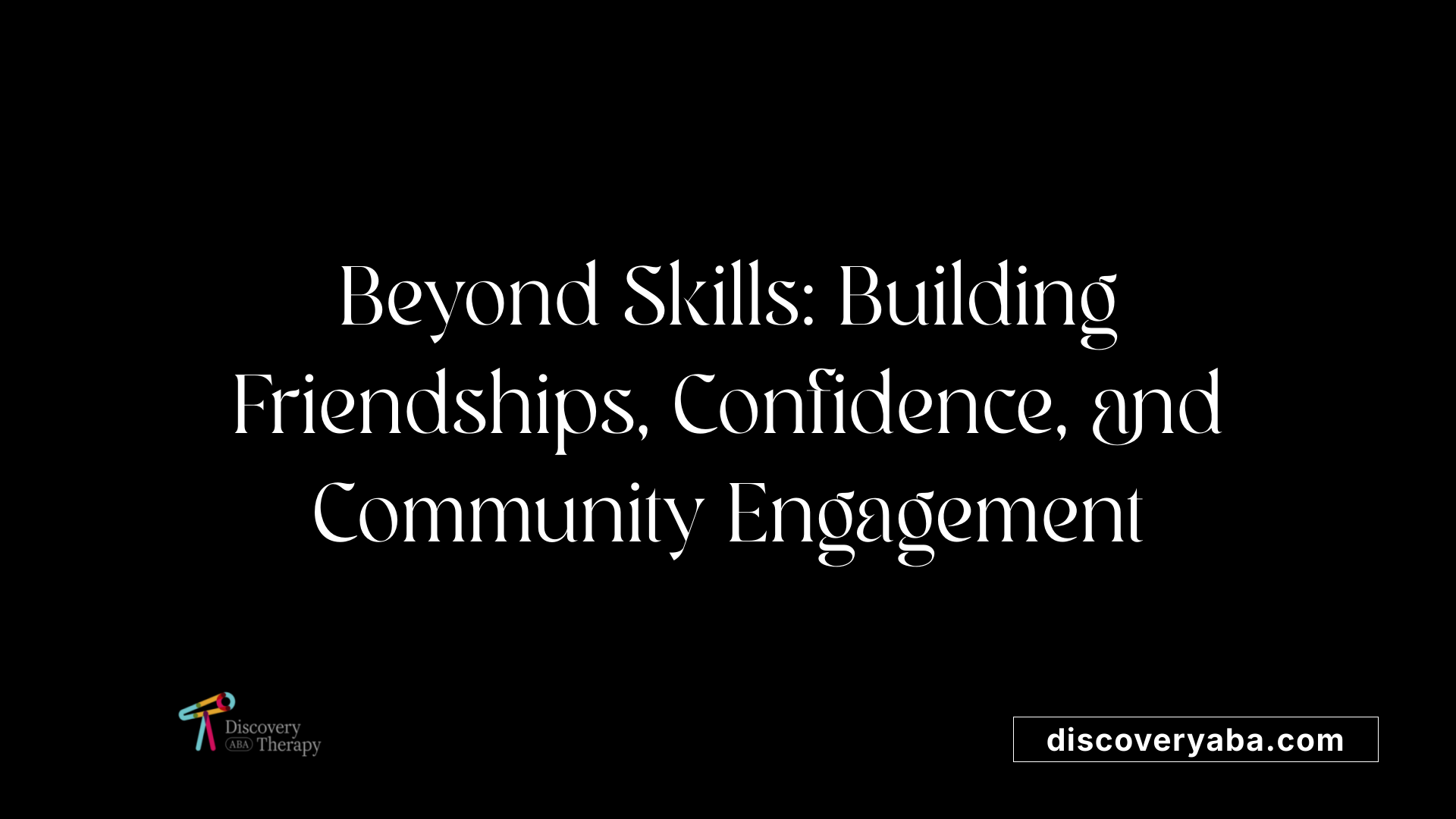
How does ABA therapy support friendship and relationship building?
ABA therapy helps teens develop essential social skills that are vital for forming and maintaining friendships. Through structured activities like role-playing and social stories, teens learn how to make eye contact, share interests, and initiate conversations.
Teens are taught to recognize social cues such as body language and facial expressions, which are important for understanding others’ feelings and intentions. These skills foster deeper connections and make peer interactions more meaningful.
What role does ABA therapy play in conflict resolution?
Conflict is a natural part of social interactions, and ABA therapy provides teens with tools for resolving disputes peacefully. Techniques like social stories and problem-solving exercises help them understand how to express their feelings and listen to others.
Practicing these skills in a controlled setting prepares teens to handle disagreements calmly in real-life situations. Teaching them to respect boundaries and find mutually acceptable solutions supports healthier relationships.
How does ABA assist in emotional regulation and self-advocacy?
Managing emotions is crucial for successful social engagement. ABA therapy includes training on identifying emotions, using calming strategies, and expressing needs assertively.
Teens learn to recognize their feelings and communicate effectively, which boosts confidence and independence. These skills are foundational for advocating for themselves in school, work, and personal relationships.
In what ways does ABA promote community engagement?
Participation in community activities helps teens apply their social skills in diverse settings. ABA focuses on generalizing learned behaviors beyond therapy sessions.
Guided practice in real-world environments, such as shopping or attending events, helps teens navigate new social landscapes confidently. This fosters independence and a sense of belonging within their community.
Social Skill AreaTechniques UsedBenefitsFriendship BuildingRole-playing, modelingStronger peer relationshipsConflict ResolutionProblem-solving, social storiesPeaceful conflict handlingEmotional RegulationIdentifying emotions, calming strategiesIncreased self-controlCommunity EngagementNatural Environment Teaching, structured outingsGreater independence
ABA therapy equips adolescents with broad social competencies that extend into everyday life. These skills support their journey toward becoming confident, independent members of their communities, fostering lifelong relationships and personal growth.
The Path Forward: Integration and Support Systems in ABA Therapy
How does family involvement enhance ABA therapy for teens?
Family involvement is vital in ABA therapy as it ensures consistency and reinforcement of learned social skills outside therapy sessions. Parents and caregivers are encouraged to observe sessions, reinforce positive behaviors at home, and practice social skills during daily activities. This ongoing support helps teens internalize skills like conversation starters, recognizing nonverbal cues, and respecting boundaries, leading to more meaningful social interactions.
What role do community programs play in supporting social skills development?
Community programs complement ABA therapy by providing real-world environments where teens can practice social skills. These programs include structured activities, social clubs, or recreational groups that foster peer interaction and teamwork. Such settings help teens generalize skills learned in therapy, such as turn-taking and active listening, and build confidence in natural social contexts.
How can school-based interventions supplement ABA strategies?
Schools are an essential environment for social skills development. Integrating ABA strategies into school routines involves training teachers and staff to reinforce skills like peer interaction, emotional regulation, and communication. School-based interventions may include social skills groups, visual supports, and role-playing exercises during class or extracurricular activities. This integration promotes consistency and helps teens apply skills across various settings.
Why is training for teachers and caregivers important?
Training for teachers and caregivers equips them with the knowledge to support social skills development effectively. It includes understanding ABA techniques, recognizing social cues, and providing appropriate reinforcement. Well-trained adults can facilitate practice, model desired behaviors, and create supportive environments that motivate teens to engage socially. This collaborative approach ensures that progress is sustained and skills are generalized beyond therapy.
How do comprehensive support systems improve outcomes?
Combining family involvement, community programs, and school-based interventions creates a robust support network. These systems reinforce social skills in multiple settings, making learning more natural and enduring. Supportive environments foster confidence, reduce social anxiety, and promote independence, ultimately helping teens form friendships and participate actively in their communities.
Empowering Teens for Social Success
ABA therapy offers a promising, scientifically supported pathway to improve social skills in teens with autism and developmental delays. Through individualized techniques such as modeling, role-playing, reinforcement, and structured teaching, adolescents can learn to communicate effectively, build friendships, and navigate complex social environments with confidence. Collaboration among therapists, parents, educators, and community programs enhances the sustainability of these gains, promoting greater independence and social inclusion. With ongoing research affirming its effectiveness, ABA remains a vital tool in empowering teens to achieve meaningful social success.
References
Does Your Child Have An Autism Diagnosis?
Learn More About How ABA Therapy Can Help
Find More Articles
Contact us
North Carolina, Nevada, Utah, Virginia
New Hampshire, Maine
Arizona, Colorado, Georgia, New Mexico, Oklahoma, Texas
.avif)




































































































